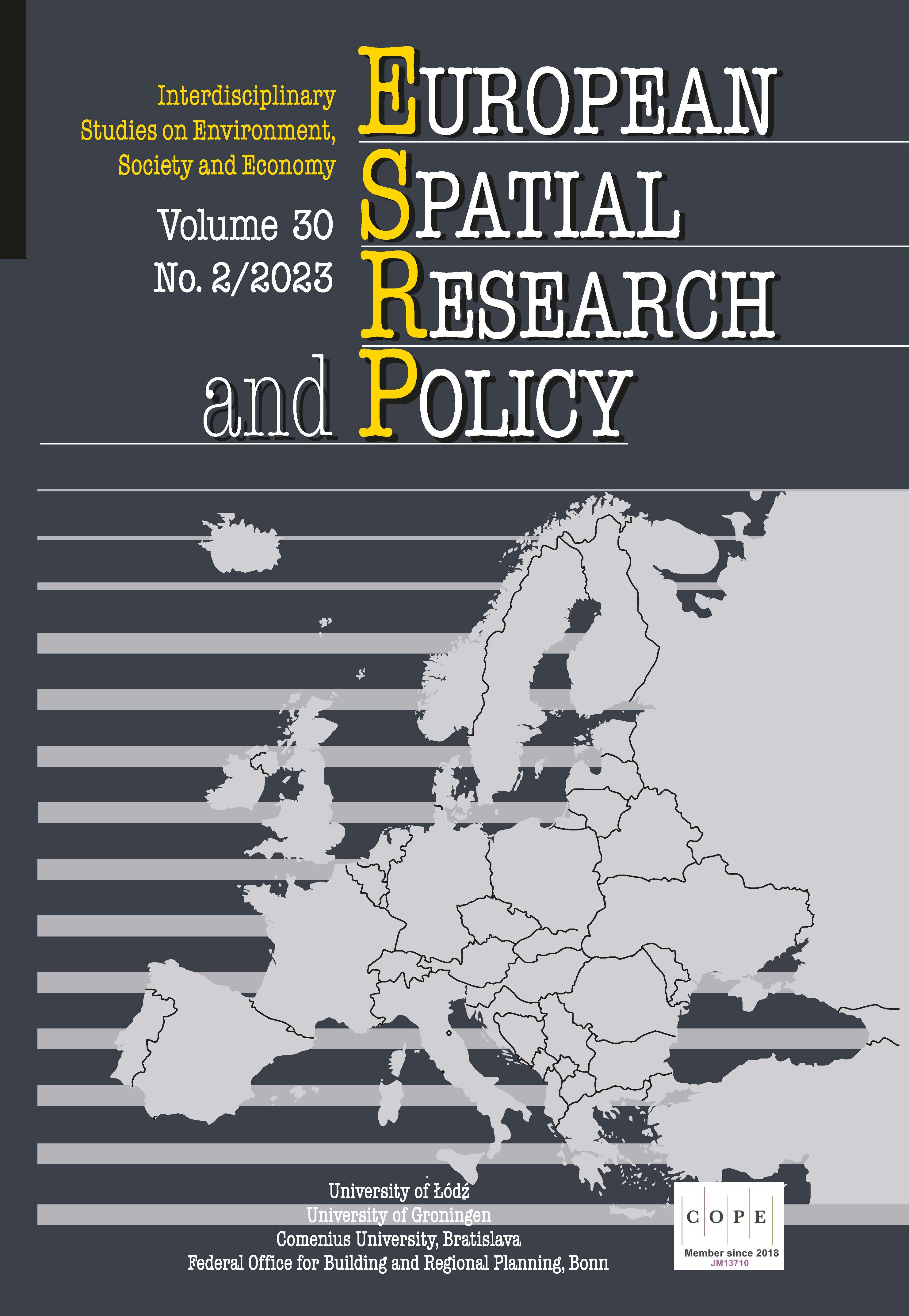Adding value by national reporting to sustainability approaches of the local-regional level: The case of Germany
DOI:
https://doi.org/10.18778/1231-1952.30.2.04Keywords:
Urban Studies, Urban Development, Sustainable Development, Sustainable Development Goals, New Urban Agenda, GermanyAbstract
Global socio-environmental challenges and local impacts, global agendas, and local implementation: multi-level governance has never been more important – or more complex. To keep track of progress and the challenges in sustainable urban development, monitoring systems at all levels are at different stages of development and in need of harmonisation. In this context, national reporting can link the global level with the local one by identifying and reviewing framework conditions, and setting indicator and data standards for cities, counties, and municipalities. This raises questions about the awareness of different issues, resource imbalances and, not least, the effectiveness of standardised monitoring. This paper provides valuable insights into the lessons learned from the preparation of the first national progress report on the implementation of the New Urban Agenda. The reflections could support further governance and monitoring efforts not only at the national level but also across all levels.
Downloads
References
BBR – BUNDESAMT FÜR BAUWESEN UND RAUMORDNUNG (2000), Stadtentwicklung und Städtebau in Deutschland – Ein Überblick. Berichte, Band 5, Bonn.
Google Scholar
BBSR – FEDERAL INSTITUTE FOR RESEARCH ON BUILDING, URBAN AFFAIRS AND SPATIAL DEVELOPMENT (ed.) (2021), National Progress Report on the implementation of the New Urban Agenda, BBSR-Online-Publikation 03/2021, https://www.bbsr.bund.de/BBSR/EN/publications/OnlinePublications/2021/bbsr-online-03-2021-dl.pdf?__blob=publication-File&v=4 [accessed on: 17.03.2023].
Google Scholar
BHATTACHARYA, D. and ALI, M. A. (2014), The SDGs–What are the “Means of Implementation”?, Future United Nations Development System.
Google Scholar
BPB – FEDERAL AGENCY FOR CIVIC EDUCATION (2002), Lokale Agenda 21 in Deutschland – eine Bilanz, Politik und Zeitgeschichte (B 31–32/2002).
Google Scholar
BERTELSMANN STIFTUNG (ed.) (2016), Monitor Nachhaltige Kommune – Bericht 2016 – Teil 1. Ergebnisse der Befragung und der Indikatorenentwicklung, Gütersloh, https://www.bertelsmann-stiftung.de/fileadmin/files/Projekte/Monitor_Nachhaltige_Kommune/Monitorbericht_Teil-1_Druck_final.pdf [accessed on: 17.03.2023].
Google Scholar
FEDERAL STATISTICAL OFFICE OF GERMANY (2023), Sustainable development strategies and indicators of the Länder, https://www.destatis.de/EN/Themes/Society-Environment/Sustainable-Development-Indicators/German/SubstainableDevelopmentIndicatorsLaender.html?nn=24072 [accessed on: 21.07.2023].
Google Scholar
GILES-CORTI, B., LOWE, M. and ARUNDEL, J. (2020), ‘Achieving the SDGs: Evaluating indicators to be used to benchmark and monitor progress towards creating healthy and sustainable cities’, Health Policy, 124 (6), pp. 581–590. https://doi.org/10.1016/j.ecolind.2015.08.003
Google Scholar
HÁK, T., JANOUŠKOVÁ, S. and MOLDAN, B. (2016), ‘Sustainable Development Goals: A need for relevant indicators’, Ecological Indicators, 60, pp. 565–573. https://doi.org/10.1016/j.ecolind.2015.08.003
Google Scholar
HERTLE, H., DÜNNEBEIL, F., GURGEL, B., RECHSTEINER, E. and REINHARD, C. (2019), BISKO Bilanzierungs-Systematik Kommunal – Empfehlungen zur Methodik der kommunalen Treibhausgasbilanzierung für den Energie- und Verkehrssektor in Deutschland, Heidelberg, https://www.ifeu.de/publikation/bisko-bilanzierungs-systematik-kommunal/ [accessed on: 17.02.2023].
Google Scholar
HUBRICH, S., LIEßKE, F., WITTWER, R., WITTIG, S. and GERIKE, R. (2019), Methodenbericht zum Forschungsprojekt „Mobilität in Städten – SrV 2018“, Technische Universität Dresden, https://tu-dresden.de/srv [accessed on: 17.03.2023].
Google Scholar
JOSSIN, J., PETERS, O., HOLZ, P. and GRABOW, B. (2020), Methodik zur Entwicklung von SDG-Indikatoren für Kommunen, [in:] Bertelsmann Stiftung, Bundesinstitut für Bau-, Stadt- und Raumforschung, Deutscher Landkreistag, Deutscher Städtetag, Deutscher Städte- und Gemeindebund, Deutsches Institut für Urbanistik, Engagement Global (Servicestelle Kommunen in der Einen Welt), Rat der Gemeinden und Regionen Europas / Deutsche Sektion (Hrsg.), SDG-Indikatoren für Kommunen – Indikatoren zur Abbildung der Sustainable Development Goals der Vereinten Nationen in deutschen Kommunen. 2nd edition. Gütersloh, pp. 34–157, https://www.bertelsmann-stiftung.de/de/publikationen/publikation/did/sdg-indikatoren-fuer-kommunen-all [accessed on: 17.03.2023].
Google Scholar
KNIPPERTS, J. (2020), SDG-Indikatoren für kommunale Entwicklungspolitik – Indikatoren für den entwicklungspolitischen Beitrag von Kommunen zu den Sustainable Development Goals, Gütersloh: Bertelsmann
Google Scholar
Stiftung.
Google Scholar
KOCH, F., KRELLENBERG, K.. REUTER, K.. LIBBE, J.. SCHLEICHER, K., KRUMME, K., SCHUBERT, S. and KERN, K. (2019), ‘Wie lassen sich die Sustainable Development Goals umsetzen?’ disP – The Planning Review, 55 (4), pp. 14–27. https://doi.org/10.1080/02513625.2019.1708063
Google Scholar
PERRY, B., DIPROSE, K., TAYLOR BUCK, N. and SIMON, D. (2021), ‘Localizing the SDGs in England: challenges and value propositions for local government’, Frontiers in Sustainable Cities, 3. https://doi.org/10.3389/frsc.2021.746337
Google Scholar
OECD – Organisation for Economic Co-operation and Development (2020), A Territorial Approach to the Sustainable Development Goals: Synthesis report, OECD Urban Policy Reviews, OECD Publishing, Paris. https://doi.org/10.1787/e86fa715-en
Google Scholar
RUDD, A., SIMON, D., CARDDAMA, M., BIRCH, E. L. and REVI, A. (2018), ‘The UN, the urban sustainable development goal, and the New Urban Agenda’, [in:] T. ELMQVIST, X.
Google Scholar
BAI, N. FRANTZESKAKI, C. GRIFFITH, D. MADDOX, T. MCPHEARSON, et al. (eds), Chapter 9, Urban Planet (University Press Cambridge), pp. 180–196, http://www.cambridge.org/9781107196933 [accessed on: 17.03.2023].
Google Scholar
SHI, L., HAN, L., YANG, F. and GAO, L. (2019), ‘The Evolution of Sustainable Development Theory: Types, Goals, and Research Prospects’, Sustainability, 11 (24), 7158. https://doi.org/10.3390/su11247158
Google Scholar
STEFFEN, W., BROADGATE, W., DEUTSCH, L., GAFFNEY, O. and LUDWIG, C. (2015), ‘The trajectory of the Anthropocene: the great acceleration’, The Anthropocene Review, 2 (1), pp. 81−98. https://doi.org/10.1177/20530196145647
Google Scholar
BARNETT, C. and PARNELL, S. (2016), ‘Ideas, implementation and indicators: epistemologies of the post-2015 urban agenda’, Environment and Urbanization, 28 (1), pp. 87–98. https://doi.org/10.1177/0956247815621473
Google Scholar
VALENCIA, S. C., SIMON, D., CROESE, S., NORDQVIST, J., OLOKO, M., SHARMA, T., SHARMA, T. and VERSACE, I. (2019), ‘Adapting the Sustainable Development Goals and the New Urban Agenda to the city level: Initial reflections from a comparative research project’, International Journal of Urban Sustainable Development, 11 (1), pp. 4–23.
Google Scholar
Published
Versions
- 2024-02-07 (2)
- 2023-12-30 (1)
How to Cite
Issue
Section
License

This work is licensed under a Creative Commons Attribution-NonCommercial-NoDerivatives 4.0 International License.














